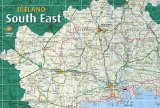South East Ireland Tourism
Travel guide to Ireland's south east
Travel guide to Ireland's south east
Lismore Town, Waterford
Lismore derives from of the Irish Lios Mor or Big Fort. The place grew to eminence through the monastery founded by Mo-Chuda of Rahan (St Carthage) in 636, just a few years before his death in 638. Eminent European figures studied at its celebrated school and despite being sacked many times by the Vikings it retained its huge influence in the kingdom of the Deise (an ancient Irish name for the area). It was a stronghold of the anchorite movement in the 8th and 9th centuries and also was prominent in the 12th century church reforms.
Almost the definitive example in these Islands of an Estate town, Lismore has, in recent years taken the firm decision to project a pride of place linked with a deep sense of history.
St. Carthage's Cathedral (Church of Ireland) stands on the site of a church built here in 1207. Old gravestones from monastic times would suggest that the site was a place of worship from the time of St. Carthage.
Walks in the locality include the Lismore Town Walk and Lady Louisa's Walk which is a beautifully wooded walk along the banks of the Blackwater - all signposted from the Heritage Centre.
Although Lismore Castle which is now the Irish residence of the Duke and Duchess of Devonshire is not open to the public, Lismore Castle Gardens can be visited.
Salmon and Trout fishing are available on the River Blackwater.
Golfing visitors can avail of the many courses available in the West Waterford area. Please check our Golf Section.
If you are touring by car, the Lismore Drive and the Vee Drive cannot be missed, where the scenery climbs and dips and changes constantly to delight the eye at every turn.
<< Return to Waterford page
Almost the definitive example in these Islands of an Estate town, Lismore has, in recent years taken the firm decision to project a pride of place linked with a deep sense of history.
Things To Do
Lismore Heritage Centre situated in the former Courthouse is a must for those who wish to experience the rich history of the town itself and its surroundings. Here, the story of Lismore is creatively interpreted in the "Lismore Experience" through the thoughts of Brother Declan, one of the followers of St. Carthage, and the recorded voice of Niall Toibin, one of Ireland's finest actors and entertainers.St. Carthage's Cathedral (Church of Ireland) stands on the site of a church built here in 1207. Old gravestones from monastic times would suggest that the site was a place of worship from the time of St. Carthage.
Walks in the locality include the Lismore Town Walk and Lady Louisa's Walk which is a beautifully wooded walk along the banks of the Blackwater - all signposted from the Heritage Centre.
Although Lismore Castle which is now the Irish residence of the Duke and Duchess of Devonshire is not open to the public, Lismore Castle Gardens can be visited.
Salmon and Trout fishing are available on the River Blackwater.
Golfing visitors can avail of the many courses available in the West Waterford area. Please check our Golf Section.
If you are touring by car, the Lismore Drive and the Vee Drive cannot be missed, where the scenery climbs and dips and changes constantly to delight the eye at every turn.
Lismore Map
<< Return to Waterford page






